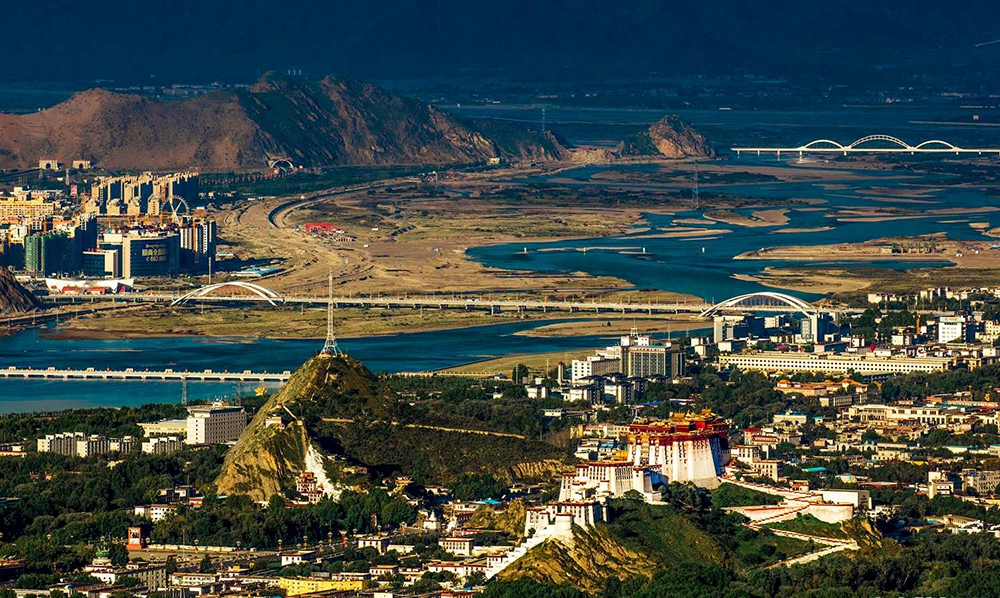Tibetan people enjoy unprecedented human rights in history
Sixty years since the epoch-making democratic reform in Tibet, people in the plateau region have enjoyed unprecedented human rights in history.
The democratic reform in Tibet in 1959, led by the Communist Party of China, ended the cruel serfdom system and emancipated one million Tibetan serfs, or more than 90 percent of the region's then population. The historic reform and implementation of the regional ethnic autonomy system in 1965 ushered the region into a new era of continuous development, progress and prosperity.
If the Abolition Movement led by former U.S. President Abraham Lincoln is viewed as an immortal achievement for civilization and human rights, the end of Tibet's feudal serfdom goes even further, for Tibetans had suffered countless darker days before the landmark reform.
Comparing Tibet before and after 1959, it's easy to see the region's huge progress in human rights.
In old Tibet, governmental officials, aristocrats and senior lamas, who represented merely 5 percent of the population, had a monopoly on almost all cultivated land, pastures, mountains, rivers and most livestock. The other 95 percent, comprised of serfs and slaves, had no personal possessions nor personal freedom, let alone human rights.
Worse still, they were treated as private property and worked for serf owners without any payment. Serf owners decided a serf's fate and could insult, punish, trade, whip and even brutally kill their serfs at will.
The cruel torture, including gouging eyes, cutting off noses, and peeling off the skin, which serfs were frequently subject to, should be seen as an epitome of the horrible human rights in Tibet at that time.
The democratic reform pulled Tibetan serfs and slaves out of their misery, while the founding of the Tibet Autonomous Region and implementation of regional ethnic autonomy endowed local residents equal rights with people living in other parts of the country.
Nowadays, with political and other rights fully guaranteed by the regional ethnic autonomy and the socialist system, Tibetan people enjoy far better human rights than they did in the old days. Tibet is in its best period of development; its human rights situation has never been in better shape.
With improved health care, the average life expectancy of Tibetan people has risen from 35.5 years in the 1950s to nearly 70 years in recent years.
The region's GDP posted double-digit growth for 25 consecutive years as of 2017. Over the past six years, Tibet's poverty-stricken population has decreased by over 80 percent from 860,000 to 150,000. The region vows to get rid of absolute poverty this year.
Tibetan people also have the right to participate in both the region's and the nation's political system. They elect deputies to local legislatures, and 92 percent of lawmakers at city, county and township levels in Tibet are ethnic Tibetans or other minorities. Tibet has 19 deputies to the National People's Congress, China's top legislature.
Tibetan people work in all walks of life. They are lawyers, teachers, doctors, government officials, scholars and artists, to name a few.
Education in Tibet is also prospering. Children enjoy 15 years of free schooling, from kindergarten through senior high school, whereas previously, there were only a few schools for monks and children from aristocratic families, leaving over 90 percent of the population illiterate. The regional government has introduced regulations to promote Tibetan language and culture.
Tibetan language learning is protected in the region. Bilingual teaching in Tibetan and Mandarin is carried out in all schools in Tibet to preserve the Tibetan language in the course of learning. The government even sends Tibetan language teachers to other provinces to make sure Tibetan students are taking Tibetan language lessons.
Stricter and more effective protection of Tibet's environment has also been implemented, with one-third of the region's land marked as nature reserves. The world's highest mountain--Mount Qomolangma--is also under effective protection.
Such undeniable facts and figures debunk the repeated lies and accusations that aim to smear Tibet's human rights with vile motives. Reviewing the development from a historical perspective helps people understand the incomparable progress of Tibet today.
Tibet is more open than ever. As a world-renowned tourist destination, Tibet received more than 30 million tourists in 2018. Any foreigners who wish to visit Tibet can apply through normal channels, and a large number of foreigners visit Tibet each year.
History has proven that the progress of human rights can be achieved not only through breaking dark and decadent systems, but also through sufficiently guaranteeing people's rights to live, develop, and realize self-fulfillment.
Anyone without bias will recogize Tibet's tremendous progress in human rights. As China strives to build a moderately prosperous society in all respects, we have reason to believe that Tibet will enjoy a better future of prosperity and progress.
Stories

Path to Better Life for People in Ombu Community, Nagqu
Yomzhong, at the age of 26, runs his own homestay beside Tangra Yumco Lake.







